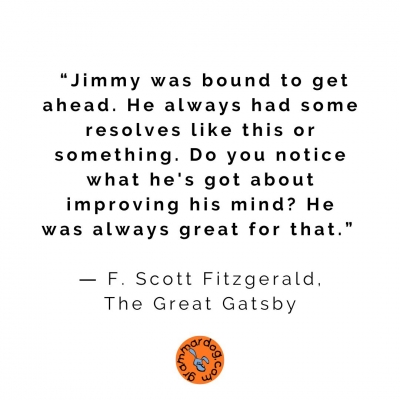Gatsby’s secret to success was his dedication to self-improvement. His routine was an American tradition that harks back to the prescribed formula for success found in Benjamin Franklin’s autobiography. When he was a farm boy named Jimmy Gatz in South Dakota, Gatsby set out to improve himself. Like Franklin, Gatz was poor with a limited education. Franklin’s formal education ended when he was ten years old. From that time forward, he was self-educated. He became a printer, author, scientist, philosopher and diplomat through his own efforts at self-improvement. Franklin explains in his autobiography how he would make charts for the week on which he kept track of his progress in perfecting his character. Gatz also made charts and kept track of exercising, reading and studying. Both the fictional Gatsby and the real man Franklin aspired to a life beyond the circumstances into which they were born. Their passport to a better life was their dedication to improving themselves.
In Chapter IX of The Great Gatsby, Jay Gatsby’s father Henry C. Gatz tells Nick Carraway that his son “was bound to get ahead” because of his daily resolves. Gatz shows Carraway his son’s routine written on a blank page in the back of the book Hopalong Cassidy.
SCHEDULE
Rise from bed 6:00 A.M.
Dumbbell exercise and wall-climbing 6:25-6:30 A.M.
Study electricity, etc. 7:15-8:15 A.M.
Work 8:30-4:30 P.M.
Baseball and sports 4:30-5:00 P.M.
Practice elocution, poise and how to attain it 5:00-6:00 P.M.
Study needed inventions 7:00-9:00 P.M.
GENERAL RESOLVES
No wasting time at Shafters or [a name, indecipherable]
No more smoking or chewing
Bath every other day
Read one improving book or magazine per week
Save $5.00 [crossed out] $3.00 per week
Be better to parents
Did F. Scott Fitzgerald borrow the idea of a self-improvement routine from The Autobiography of Benjamin Franklin published in 1771? Possibly. Or perhaps the idea of self-improvement proposed by Franklin had taken root in American culture. That an American from a poor family can rise to great heights is a key component of the American Dream. Franklin merely proved that the dream of social and economic mobility could be achieved. Here is Franklin’s routine:
Franklin constructed a weekly chart. Across the top were days of the week. On the far left were his 12 self-improvement goals. He would write an asterisk next to a goal he had achieved on a specific day. His goals were:
1. Temperance. Eat not to dullness; drink not to elevation.
2. Silence. Speak not but what may benefit others or yourself; avoid trifling conversation.
3. Order. Let all your things have their places; let each part of your business have its time.
4. Resolution. Resolve to perform what you ought; perform without fail what you resolve.
5. Frugality. Make no expense but to do good to others or yourself; i.e., waste nothing.
6. Industry. Lose no time; be always employ’d in something useful; cut off all unnecessary actions.
7. Sincerity. Use no hurtful deceit; think innocently and justly; and, if you speak, speak accordingly.
8. Justice. Wrong none by doing injuries or omitting the benefits that are your duty.
9. Moderation. Avoid extremes; forbear resenting injuries so much as you think they deserve.
10. Cleanliness. Tolerate no uncleanliness in body, clothes, or habitation.
11. Tranquility. Be not disturbed at trifles, or at accidents common or unavoidable.
12. Humility. Imitate Jesus and Socrates.
Franklin’s daily routine is similar to that of Jimmy Gatz.
5 A.M. – 9A.M. Rise, wash, and address Powerful Goodness! Contrive day’s business and take the resolution of the day; prosecute the present study, and breakfast.
9 A.M. – Noon. Work
Noon – 1 P.M. Read, or overlook my accounts, and dine.
1 P.M. – 6 P.M. Work
6 P.M. – 9 P.M. Put things in their places. Supper. Music or diversion, or conversation. Examination of the day.
10 P.M. Sleep.
Franklin writes: “But, on the whole, tho’ I never arrived at perfection I had been so ambitious of obtaining, but fell far short of it, yet I was, by the endeavour, a better and a happier man than I otherwise should have been if I had not attempted it.”



New Comment